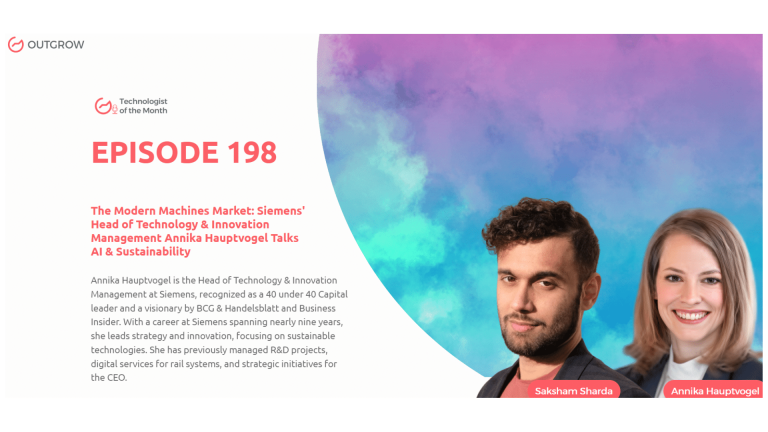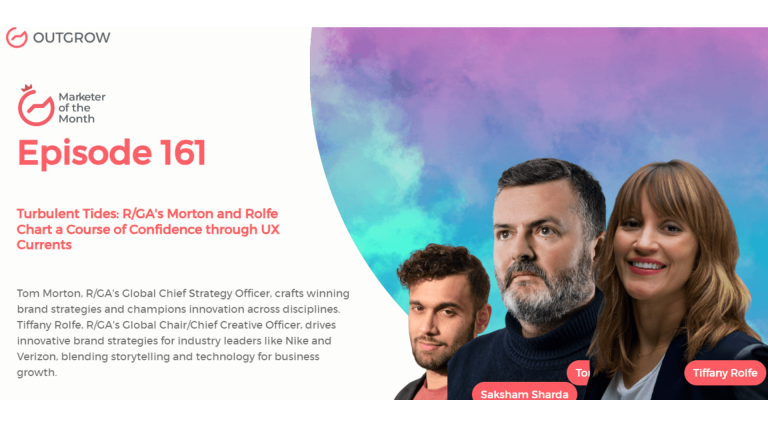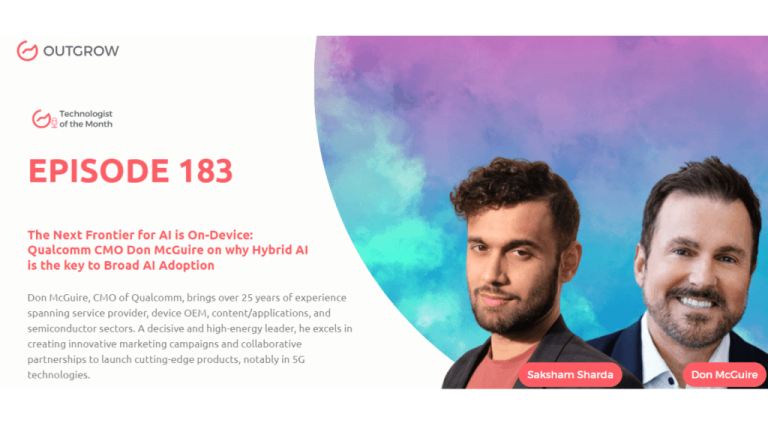EPISODE 163: Marketer of the Month Podcast with Maureen N. Dunne
Table of Contents
Hey there! Welcome to the Marketer Of The Month blog!
We recently interviewed Maureen N. Dunne for our monthly podcast – ‘Marketer of the Month’! We had some amazing insightful conversations with Maureen and here’s what we discussed about-
1. Understanding Neurodiversity and “neurodiversification”: Emphasizing neurodiversity’s strength-based perspective on different cognitive types.
2. AI and emerging technologies’ impact on job requirements and necessary skill development.
3. Exploring neurodiversity’s role in enhancing innovation and genuine inclusion strategies.
4. Strategies proposed for genuine inclusion of diverse cognitive styles in workplaces.
5. Embracing neurodiversity-friendly policies and universal design principles.
6. Importance of attracting neurodiverse talent and recognizing their leadership potential.
7. Stressing the significance of inclusive practices in navigating changing technological landscapes
About our host:
Dr. Saksham Sharda is the Chief Information Officer at Outgrow.co. He specializes in data collection, analysis, filtering, and transfer by means of widgets and applets. Interactive, cultural, and trending widgets designed by him have been featured on TrendHunter, Alibaba, ProductHunt, New York Marketing Association, FactoryBerlin, Digimarcon Silicon Valley, and at The European Affiliate Summit.
About our guest:
Maureen N. Dunne, Ph.D., is an esteemed Education Leader and Neurodiversity Expert, merging academia with social enterprise. Her book, “The Neurodiversity Edge,” underscores a commitment to inclusion. Advocating for community college education, she contributes to World Economic Forum ’24 panels, emphasizing her dedication to fostering neurodiverse talent.
Diverse Minds, Dynamic Markets: Maureen N. Dunne on Neurodiversity in Tech Innovation and Inclusion
The Intro!
Saksham Sharda: Hi, everyone. Welcome to another episode of Outgrow’s Marketer of the Month. I’m your host, Dr. Saksham Sharda, and I’m the creative director at Outgrow. co. And for this month we are going to interview Maureen N. Dunne, who is the Author of The Neurodiversity Edge.
Maureen N. Dunne: Great to be here. Thank you.
Don’t have time to read? No problem, just watch the Podcast!
Or you can just listen to it on Spotify!
The Rapid Fire Round!
Saksham Sharda: So, let’s start with the rapid-fire round. The first question is, so you can only answer with one word or one sentence, and you can say pass in case you don’t want to ask something. At what age do you want to retire?
Maureen: Never.
Saksham Sharda: How long does it take you to get ready in the mornings?
Maureen: Two minutes. Because I’m a mom of triplets.
Saksham Sharda: Most embarrassing moment of your life.
Maureen: Gosh. Pass.
Saksham Sharda: Favorite color?
Maureen: Purple.
Saksham Sharda: What time of day are you most inspired?
Maureen: One in the morning.
Saksham Sharda: How many hours of sleep can you survive on?
Maureen: Oh gosh, 30 minutes.
Saksham Sharda: Fill in the blank: An upcoming technology trend is _____.
Maureen: Artificial intelligence.
Saksham Sharda: The city in which the best kiss of your life happened.
Maureen: Pass.
Saksham Sharda: Pick one. Mark. Zuckerberg or Elon Musk.
Maureen: That’s a tough one. Pass.
Saksham Sharda: The biggest mistake of your career.
Maureen: I passed.
Saksham Sharda: How do you relax?
Maureen: Painting.
Saksham Sharda: How many cups of coffee do you drink per day?
Maureen: At least three.
Saksham Sharda: A habit of yours that you hate?
Maureen: Pass.
Saksham Sharda: The most valuable skill you’ve learned in life?
Maureen: To be resilient.
Saksham Sharda: Your favorite Netflix show?
Maureen: Pass.
Saksham Sharda: The last movie you watched that was impressionable
Maureen: Pass. I don’t have time for movies. I have triplets.
Saksham Sharda: That’s okay. The last song you’ve been listening to.
Maureen: Gosh, I just get a lot of personal stuff. I don’t know.
The Big Questions!
Saksham Sharda: So going on to the bigger questions. Which you can answer with as much ease as you like. So could you tell us about the work you’re doing and what brought you to the next web?
Maureen: Yeah. So, I’m currently working on two books. One will be released early next year, 2024, about neurodiversity and specifically about this concept, called neuro Diversification. It’s, had a really interesting time yesterday. Do you want me to talk a little bit about the book itself or what neuro diversification is? So neurodiversity is, as for those who don’t know, a strength-based perspective on different types of cognitive typology, including autism, ADHD, dyslexia, dyspraxia, and others. It originated, Judy Singer was the sort of person who coined the concept of neurodiversity back in, in the late 1990s—the nineties. he idea was really that it was sort of more, more similar to biodiversity, where we’re thinking about, different kinds of minds in a way where there’s, it’s more like there’s a normal variation of different mind kinds of minds. And so it’s a strength-based perspective rather than a sort of what we would call a deficit-based perspective.
Maureen: And I’ll just give you a quick example. Like if, you know, think about like, ADHD, we could think about ADHD in terms of like impulsivity, in terms of being distracted, in terms of not wanting to do like a lot of really tedious tasks or we could see like the flip side of that tends to be, you know, someone who’s extremely energetic, you know, very innovative, creative, a lot of creativity, a lot of energy. and, there’s, you know, some research out there about that, just entrepreneurs in general that there’s a lot of overrepresentation of neurodiversity in entrepreneurship. and then neuro diversification, that’s a concept I came up with in conversations with my husband, who’s also ADHD, and, he is working in finance. Hence, he used to be a portfolio manager. So he thinks that he talks a lot about just, you know, downside risk if you have assets that are all highly correlated, right? So anyone that has a portfolio, a retirement portfolio, or investments, you know, you’re probably constantly told by your advisor. Like, you know, make sure that you know, your assets have some that are uncorrelated, right? I’ve been thinking, you know, very differently about a similar concept more in terms of how employers, especially when you look at where things are going in the future, in terms of work, in terms of how the influence AI and, and other emerging technologies going to have, is that you know, employers need to diversify their talent pool. And, I came up with, I’ve been talking about this term neuro diversification, and it came out of these conversations with my husband, him having a very different background and the idea is that, you know, there it is important that there’s, for any company or organization, whether it’s a startup or, a Fortune 500 company that, you know, you, you diversify your talent. The truth is that if there is if all of your team members, especially even at the leadership level, they’re highly correlated in terms of analytical, perceptual, and cognitive skills. There isn’t that kind of diversity of thought or problem-solving skills, that’s a risk for your company. There’s been so much research done about, you know, like, just like looking at a lot of the biggest business disasters, so many business failures that have happened and other disasters that have happened due to groupthink. So, you know, there’s a lot of research, particularly about even autistic people, that they’re far less prone to be as influenced by social status. and so I think, you know, having, having neurodivergent people on your team is going to make your business better. And, there’s going to be that hedge against groupthink, there’s going to be, you know, different types of problem-solving skills. There will be research about just dyslexia, ADHD, autism, and enhanced creativity that could be brought to the team. And going forward, you know, thinking about just where things are going with AI and automation, that’s going to be more important than ever, in my opinion.
Saksham Sharda: Could you talk a bit about how AI is going to influence this?
Maureen: Yeah. So, obviously, you know, AI and then other, you know, emerging technologies, VR, AR, data science, machine learning, I mean all I think it’s already happening, but I think, you know, as we, as we continue, looking further into the future, I mean, it’s going to be embedded in every aspect of our lives, right? And I think it’s an interesting thing because I’m not sure many organizations, companies, and educational institutions are prepared for that. I don’t think they are. I don’t think they, I think that we should all be working faster to adapt to this new world. How things are evolving in terms of AI. And so from the workforce development perspective, this is probably the first time in history where there’s going to be some jobs that will be taken over by AI that involves cognitive work, right? I mean, we’ve seen, you know, in the past there’s been, there have been other types of jobs that have been replaced, new due to new technologies or, or automation. But this is kind of a new thing. So what I think, I think to me, what I think is obvious is that it’s so important that we all, you know, learn, to develop critical thinking skills. we may put up a higher priority as educational institutions on creativity, innovation, thinking out of the box, and experimentation. The model that we’ve had for the last hundred years isn’t going to work anymore because so many, you know, any skills that can be replaced by an algorithm will be right. So we need to learn to work alongside machines and how to operate them and have, you know, more educational opportunities and upskilling. And I think employers and industry are going to need to work more closely, much more closely than they have in the past, with universities and colleges, including community colleges in the United States, in which I have several leadership positions. and I think then also this neurodiversity, you know, being, being conscious about including neurodivergent people who are, you know, because of, of how they think that there’s going to be just more innovative, types of, of, or different types of problem-solving and analytical and perceptual tendencies that they can contribute, to an organization. And so, including people who in the past have unfortunately been marginalized is not only going to be good for those individuals because the employment rates are not great for neuro the neuro diversion population. They’re poor. But it’s going to be a win-win because it’s going to be critical to the companies and the organizations themselves for them to survive.
Saksham Sharda: And are these some of the points your book touches upon? Could you tell us more about what your book touches upon?
Maureen: Yeah. So in my book, you know, have a framework where I’m offering, the reader, you know, sort of a tour towards, you know, what neurodiversity is, you know, examples of, of, you know, the enhanced innovation, different types of thinking, matter of thinking, non-linear thinking,visual-spatial thinking, reverse engineering, lots of skill sets that are, really important to innovation right in entrepreneurship and why that’s valuable to companies. It’s really at the heart, it’s a values-driven approach to diversity and inclusion. I get into more the sort of nuts and bolts of what you can do as a leader or, you know, even as a teammate or an ally in an organization like everyone can play a role in, helping to include neurodivergent workers, I call it, authentic neurodiversity inclusion because I, you know, it doesn’t, it’s not helpful if you hire neurodivergent people and you and it’s just about ticking the boxes. Like that’s, that you don’t, you know, that’s not where you get the benefit of this amazing, unique talent, okay? You want to authentically include individuals and welcome them. There are several strategies and tactics, templates and exercises, and practical tips that I give to leaders, employers, and organizations on how they can welcome neurodivergent talent, get the most out of all of their employees, and build a strong organizational culture.
Saksham Sharda: Could you give us an example of one such strategy?
Maureen: Yeah. So there’s, you know, I think it’s important to, first of all, adopt what I would call neurodiversity-friendly policies and also think along the lines of universal design principles. And so, again, an example that’s not neurodiversity specific, but I think most people can relate to is, when ramps were developed, right? You know, it was initially to make the world more accessible for people in wheelchairs, but it benefits everyone. Like some so many people are not, are beyond, you know, people in wheelchairs that it’s critical. You know, there’s, I remember, so I got my mom and triplets. I remember, you know, when my kids were babies and having our triple stroller, right? Can’t go upstairs on a trip with a triple stroller. So, just making, you know, thinking more broadly about how to make your environment more accessible. and so for neuro diversion people, that could mean if it is required to work in person and we can’t get into it, that’s another issue that could be important for this population. But if that is a requirement or important or if it’s a hybrid arrangement, you know, something as simple as having a quiet room, right? Available, there’s several like autistic people who experience what we’d call sensory overload and could be very sensitive to sounds or light and just, you know, being flexible, right? Having flexibility with allowing, for breaks, you know, sensory breaks, having some more control over the lighting, where that person is working flexible policies about the use of headphones. And again, this goes back to universal design, this doesn’t necessarily have to be just for neuro diversion employees. If you have a flexible policy that all employees can benefit from, because there are going to be employees that you know are just going to work better, right? If they can use their headphones, then the idea is like, you know, to focus on outcomes and deliverables and to be more flexible on how to get there in the process. And then, you know, along with that, I’d say that being flexible whenever possible with either remote or hybrid working also is important to, attract this kind of neurodivergent talent that, you know, there are so many neurodivergent people that won’t be attracted to an opportunity unless that kind of flexible arrangement is offered. So it’d be in the employer’s best interest to do that. and then finally, you know, higher neurodivergent people not, you know, at all levels of the organization, including leadership, you know, neuro diversion people don’t make just good contributors. They make great leaders. Throughout history, many of our great innovators, entrepreneurs, and leaders have been neurodivergent whether they disclosed or not and so there are a lot of really exceptional people out there that could drive a company right to the next level. And it also, if you have someone in leadership that’s neurodivergent, that sends the message to the world and other neurodivergent people, that you are a neurodivergent friendly place and that’s going to attract other neurodivergent workers and talented people that you will want to hire.
Let’s Conclude!
Saksham Sharda: Thanks, everyone for joining us for this month’s episode of Outgrow’s Marketer of the Month. That was Maureen N. Dunne, who is the Author of The Neurodiversity Edge.
Maureen N. Dunne: Great to be here. Thank you.
Saksham Sharda: Check out the website for more details and we’ll see you once again next month with another marketer of the month.

Muskan is a Marketing Analyst at Outgrow. She is working on multiple areas of marketing. On her days off though, she loves exploring new cafes, drinking coffee, and catching up with friends.









